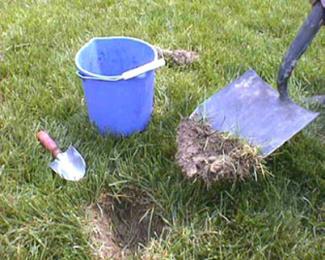
Soil test kits can be purchased from MSU Extension in Washtenaw County.
MSUE: 734-997-1678, 705 N. Zeeb Rd, Ann Arbor, MI 48103.
They are available on the MSUE website store.
Plants take up nutrients from the soil and over time nutrients need to be replenished. Soil testing helps in determining soil nutrient levels and deficiencies in your soil and provides a basis for determining how much and what type of fertilizer is needed for the plants you want to grow.
Test results from the Home Lawn and Garden Soil Test Mailer: pH, Phosphorus (P), Potassium (K), Calcium (Ca), and Magnesium (Mg). You will also receive recommendations for fertilizer and any needed pH modifications. This is NOT a test for soil contamination or toxicity.
Equipment Needed
- Plastic pail
- Garden trowel or spade, sampling probe or soil auger
- Soil Test Mailer envelope and contents
- Optional: Soil Probe - available to rent from WCCD Handtool Lending Library!
Taking the Sample
Soil samples may be taken at any time during the year when temperatures (lack of frost) and moisture conditions permit.
- Decide which one lawn or garden area you would like to test.
- Using your trowel, probe or other sampling device, take 10 random soil samples from the selected area—about ½ cup each.
Suggested sampling depths are:
- Lawns - 3 inches
- Shrubs, Trees or Other Plants - 7 inches
Sample in a random pattern throughout the area to be sampled. Place your 10 soil samples in the plastic pail.
When you have finished taking all 10 samples, mix the soil in the pail thoroughly.
If the soil is wet, spread it on paper and allow to air dry overnight before filling the sample bag. Do not use artificial heat, such as an oven, microwave or hair dryer to force-dry the soil.
Place roughly 1 cup of the dry, well-mixed soil inside the resealable plastic bag and seal carefully. DO NOT overfill the plastic bag. DO NOT pour extra loose soil inside the white postage paid mailing envelope. Remove stones, plant roots, leaves, worms, insects, or other non-soil matter from the soil placed in the bag.
Complete Soil Test Mailer Form
Fill in the information on the Mailer Form. Be sure to include an e-mail address to receive your results.
Mail Sample to Testing Lab
Fill out the sample identification label and insert into the outer pocket of the sample plastic bag. Place the plastic soil sample bag and the white copy of the Soil Test Mailer Form (keep the yellow copy for your records) in the postage-paid mailing envelope, seal the mail via the U.S. Postal Service.
Other Soil Testing Labs & Resources:
More details on Soil & plant analysis labs on the Service Provider page.
- Logan Labs - Soil Testing Services: Various soil sample testing packages starting at $25.
- BioNutrient Food Association - Soil test instructions and BFA members get free soil results consultation.
- Crop Services International - "guiding growers whose goals are transitioning to more sustainable growing paradigms".
I have my soil test results! Now what?
All:
Home Gardeners:
- https://www.canr.msu.edu/uploads/files/Healthy_soils.pdf
- https://extension.psu.edu/soil-management-in-home-gardens-and-landscapes
Agriculture/Commercial Growers: